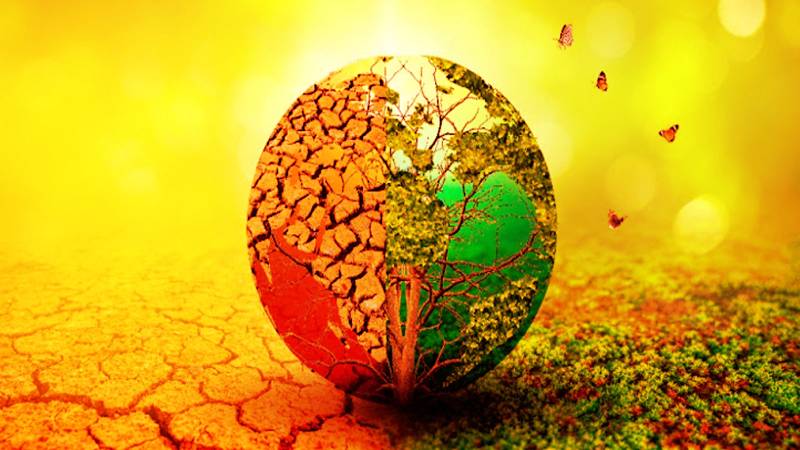
Recently, Earth experienced its hottest three months on record, as reported by the European Union-funded Copernicus Climate Change Service (C3S). Global sea surface temperatures have reached unprecedented highs for the third consecutive month, while Antarctic sea ice extent remains at a record low for this time of year. August temperatures were approximately 1.5 degrees warmer than the preindustrial average for 1850–1900.
Let's consider the Sustainable Development Goals. Unfortunately, none of them are on track to be achieved by the 2030 deadline. However, progress on the Climate Goal SDG13 has been regressing. It resonates with many that "hypocrisy is threatening the future sustainability of our planet, Earth."
Climate change has now escalated to a climate emergency. Numerous countries worldwide, whether rich, poor, developing, or emerging economies, have directly felt its impact. The warnings from the Intergovernmental Panel on Climate Change (IPCC) are loud and clear: global greenhouse gas emissions must halve by 2030 and reach net zero by 2050. Yet, practical actions, particularly those related to providing financial aid to developing nations for climate change adaptation and mitigation, remain elusive.
Powerful nations are undermining progress towards global sustainability. Rich countries are addressing climate change while neglecting energy justice and deferring discussions on how to finance a low-carbon emission path. Their strategy appears to be nothing more than green-washed colonialism.
Consider a few examples of double standards:
In June, Norway announced new permits for offshore oil and gas drilling and proposed opening some 280,000 square kilometers of its waters to deep-sea mining. Meanwhile, France, the host nation for an upcoming UN Ocean Conference in 2025, opposes measures to exclude destructive bottom trawling from marine protected areas in the EU.
The European Union seems to operate with two sets of policies. While highlighting successes such as a 37% decrease in fishing pressure and a 22% increase in fish biomass in its waters between 2005 and 2020, it fights against conservation measures in the Indian Ocean to curb chronic overfishing of yellowfin tuna. EU vessels harvest up to one-third of the tuna in these waters, aided by fish-aggregating devices. A study found that this fleet emits more than 500,000 metric tonnes of CO2 over the Western Indian Ocean from burning tax-free fuel from the Seychelles.
Japan stands as one of the largest importers of LNG (liquefied natural gas). Meanwhile, the US, amidst global heatwaves, prioritizes fossil fuel profits over people. From the Willow Project in Alaska to Gulf LNG exports, the US supports dangerous oil and gas projects and corporations that prioritize their bottom line over our future.
Reports from the International Energy Agency (IEA) and the Intergovernmental Panel on Climate Change (IPCC) emphasize that limiting global warming to 1.5 degrees Celsius requires an immediate end to investments in new coal, oil, and gas production and hazardous liquified fossil gas (LNG) infrastructure. This holds even in the context of the war in Ukraine, and as the World Energy Outlook stated last year, "No one should imagine that Russia’s invasion can justify a wave of new oil and gas infrastructure in a world that wants to reach net-zero emissions by 2050."
The US's approach to the climate crisis is undeniably hypocritical. While the US aligns its rhetoric with global climate promises, its administration approves massive fossil fuel projects. The United States stands as the world's top oil and gas producer and exporter, planning the largest expansion in oil and gas production over the next decade. Just this year, the US greenlit the Willow oil project in Alaska, multiple LNG export facilities, and the Mountain Valley fracked gas pipeline, bypassing crucial permitting processes meant to protect people and the environment.
Other major maritime nations, including China, India, Brazil, and Russia, also face significant challenges in achieving SDG 13 (climate action). However, none of them present themselves as climate leaders.
The critical question we face is: for how long will the human race continue paying lip service only? Even if we can deceive our fellow humans, we cannot deceive nature. The price we'll pay is exceedingly high—too high to afford.
We do not own the earth; we borrow it from our children. We bear a moral responsibility to ensure that future generations inherit a planet as healthy and habitable as the one we received. By overexploiting natural resources and neglecting environmental protection, we are effectively stealing from our children's future.
In this era of climate crisis, the choices we make today will define the world we leave for generations to come. Hypocrisy, as the foremost adversary to sustainability, must be unmasked and dismantled. It's time to bridge the gap between words and actions, to hold ourselves and our leaders accountable, and to recognize that our planet's well-being transcends politics, borders, and profits. The urgent call for action echoes not just in scientific data but in the voices of the young and the marginalized, who demand a livable Earth. Our planet is a shared inheritance, a fragile gift entrusted to our care. It's a testament to our collective conscience and moral duty to safeguard it, ensuring that it thrives for our children and theirs—a legacy of stewardship, not hypocrisy.

